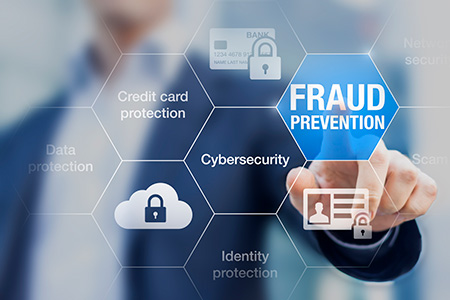Most of us know at least one person who’s fallen victim to some form of identity theft. It’s a familiar culprit that caused $56 billion in losses in 2020 alone, according to Javelin Strategy & Research. As a wealth manager, I can tell you firsthand that identity theft can wreak havoc on your financial life. While many banks and credit card companies offer some level of protection to help you recoup your losses, many still get stuck with a drained bank account or negative activity on their credit reports—messes they have to clean up themselves.
If you’ve recently discovered that you’ve been victimized, don’t panic. Taking the following steps can help minimize the damage and prevent further financial headaches.

Alert All Affected Companies and Organizations
Think about where you noticed the fraud. Whether it was an odd credit card charge or a checking account transaction that seemed fishy, the first action item on your list is to contact the fraud department at any affected bank or creditor. Alert them of the situation so they can document it on their end and hopefully stop the fraudster in their tracks. This will likely involve cancelling your credit or debit card.
Those who’ve been the victim of tax identity theft will have to submit an Identity Theft Affidavit to the IRS. (This form of fraud typically happens when someone files a tax return in your name, then collects the refund.)
Put Fraud Alerts in Place
It’s wise to contact one of the three consumer credit bureaus (listed below) to put a fraud alert in place. The good news is that once you do this with one credit bureau, the other two will be notified automatically. A fraud alert adds a notification to your credit report so that lenders know to verify your identity before approving any new applications. This can help prevent the identity thief from opening new accounts in your name.
- Equifax: (800) 685-1111
- Experian: (888) 397-3742
- TransUnion: (888) 909-8872
Freeze and Review Your Credit Reports
While we’re on the topic of credit bureaus, keep in mind that each one issues its own credit report that lists your open credit accounts, payment activity, balances and personal identifying information. Once you know your identity has been compromised, you’ll want to review your credit reports for red flags—like new accounts you don’t recognize, strange balance increases, or delinquent remarks from creditors.
Consumers can obtain their credit report from all three bureaus at annualcreditreport.com or by calling (877) 322-8228. If you spot something fraudulent, you can contact each credit bureau individually to dispute the errors and have them removed from your credit report.
You’ll also want to consider contacting each credit bureau to freeze your credit reports. Doing so prevents lenders from pulling your credit at all, which means they can’t approve new credit applications in your name without your express consent.
Freeze Other Important Reports and Data
On top of freezing your credit reports, you can also put a security freeze on something called your ChexSystems consumer file. This is a nationwide specialty consumer reporting agency that maintains information about checking and savings accounts. By placing the freeze, an identity thief will be unable to use your name to open a bank account. You can initiate this security measure here.
Similarly, you can put a freeze on your Exchange Service Center Data Report. This document is created by the National Consumer Telecom & Utilities Exchange (NCTUE)—a consumer reporting agency that maintains payment and account data for a wide variety of telecom services, like cell phones, utilities and pay television. To protect this information, you can set up a security freeze here.
Report the Identity Theft to the FTC
The Federal Trade Commission provides resources to consumers who’ve been victims of identity theft. This begins by visiting IdentityTheft.gov to create an FTC Identity Theft Report. From there, they’ll help you develop a personalized recovery plan, along with support to help you carry out it. This includes tracking your progress and providing templates of forms and letters you may need. The FTC can also advise you regarding whether or not you should file a police report.
Request an Identity Protection PIN from the IRS
Getting an Identity Protection (IP) PIN from the IRS makes it that much harder for someone else to use your Social Security number to file a tax return. The IRS will issue you a new IP PIN every December that’s good for the current tax year. Hang onto it; you’ll need to provide this number when you’re ready to file your tax return.
See if the Identity Theft Is Covered
If your identity has been stolen, you can also check to see if the theft is covered by an identity theft protection plan. Even if you haven’t purchased coverage yourself, there’s a possibility you have it through your employer or insurer. With so much sensitive information living in employee personnel files, for example, many employers offer identity theft coverage as an employee benefit. You won’t know unless you ask, so be sure to contact your human resources department or insurance companies to find out.
How to Protect Yourself from Identity Theft Going Forward
Once you’ve put out the fires caused by your identity theft, you can take simple precautions to prevent it from happening again. Keep your Social Security number safe and never carry your card in your wallet. Creating a my Social Security account can also help you keep track of your records so you can identity any activity that rubs you the wrong way.
Credit monitoring is another service that can give you a heads up of new activity on your credit reports. This includes personal information changes, new accounts, hard inquiries, and balance or payment changes. If the credit monitoring service catches something, they’ll send you an alert ASAP. Think of it as a hands-off way to protect yourself from fraud.
Dealing with the fallout of identity theft can be a costly, stressful experience that has serious repercussions on your financial life. At JJ Burns & Company, we understand the emotional and logistical toll it can take. Think of us as your financial partner—we’re in your corner and ready to help you restore your financial health. Contact us for a complimentary phone consultation.




